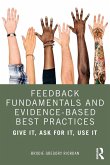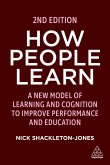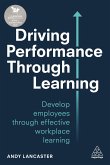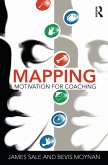Lise Lewis (UK Bluesky International)
Relational Feedback
Why Feedback Fails and How to Make It Meaningful
Lise Lewis (UK Bluesky International)
Relational Feedback
Why Feedback Fails and How to Make It Meaningful
- Gebundenes Buch
- Merkliste
- Auf die Merkliste
- Bewerten Bewerten
- Teilen
- Produkt teilen
- Produkterinnerung
- Produkterinnerung
This book offers a new way of engaging in authentic feedback and focuses on relationships to improve the reputation, providing examples of existing good practice. It will appeal to those seeking an innovative approach to performance management and who welcome a reprieve from the relentless pursuit of a universal feedback tool.
Andere Kunden interessierten sich auch für
![Feedback Fundamentals and Evidence-Based Best Practices Feedback Fundamentals and Evidence-Based Best Practices]() Brodie Gregory RiordanFeedback Fundamentals and Evidence-Based Best Practices29,99 €
Brodie Gregory RiordanFeedback Fundamentals and Evidence-Based Best Practices29,99 €![Human Resources for the Non-HR Manager Human Resources for the Non-HR Manager]() Carol T. KulikHuman Resources for the Non-HR Manager174,99 €
Carol T. KulikHuman Resources for the Non-HR Manager174,99 €![How People Learn How People Learn]() Nick Shackleton-JonesHow People Learn29,99 €
Nick Shackleton-JonesHow People Learn29,99 €![Driving Performance through Learning Driving Performance through Learning]() Andy LancasterDriving Performance through Learning26,99 €
Andy LancasterDriving Performance through Learning26,99 €![Human Resources for the Non-HR Manager Human Resources for the Non-HR Manager]() Carol T. KulikHuman Resources for the Non-HR Manager42,99 €
Carol T. KulikHuman Resources for the Non-HR Manager42,99 €![Relational Leadership Relational Leadership]() Nicholas ClarkeRelational Leadership40,99 €
Nicholas ClarkeRelational Leadership40,99 €![Mapping Motivation for Coaching Mapping Motivation for Coaching]() James Sale (UK Motivational Maps Limited)Mapping Motivation for Coaching52,99 €
James Sale (UK Motivational Maps Limited)Mapping Motivation for Coaching52,99 €-
-
-
This book offers a new way of engaging in authentic feedback and focuses on relationships to improve the reputation, providing examples of existing good practice. It will appeal to those seeking an innovative approach to performance management and who welcome a reprieve from the relentless pursuit of a universal feedback tool.
Hinweis: Dieser Artikel kann nur an eine deutsche Lieferadresse ausgeliefert werden.
Hinweis: Dieser Artikel kann nur an eine deutsche Lieferadresse ausgeliefert werden.
Produktdetails
- Produktdetails
- Verlag: Taylor & Francis Ltd
- Seitenzahl: 228
- Erscheinungstermin: 6. Februar 2020
- Englisch
- Abmessung: 162mm x 240mm x 20mm
- Gewicht: 516g
- ISBN-13: 9781138063914
- ISBN-10: 1138063916
- Artikelnr.: 68430238
- Herstellerkennzeichnung
- Libri GmbH
- Europaallee 1
- 36244 Bad Hersfeld
- gpsr@libri.de
- Verlag: Taylor & Francis Ltd
- Seitenzahl: 228
- Erscheinungstermin: 6. Februar 2020
- Englisch
- Abmessung: 162mm x 240mm x 20mm
- Gewicht: 516g
- ISBN-13: 9781138063914
- ISBN-10: 1138063916
- Artikelnr.: 68430238
- Herstellerkennzeichnung
- Libri GmbH
- Europaallee 1
- 36244 Bad Hersfeld
- gpsr@libri.de
Lise Lewis is the founder of Bluesky International and an EMCC Global Special Ambassador. She is also an EIA Master Coach, ESIA Coach Supervisor, provider of global coach and coach supervisor training virtually and in organisations, as well as a researcher and author contributing to Coaching Supervision: Advancing Practice, Changing Landscapes and 'CIPD Coaching Toolkit'.
Acknowledgements
Foreword
Author Foreword
Introduction
1 What perceptions exist about Feedback
Definitions of Feedback
Willingness to engage in Feedback - the psychological perspective
The Effectiveness of Feedback - for both the giver and receiver
2 Why Feedback and Whose Responsibility is it? The business case for Feedback
The leader manager's perspective
The people professional's perspective
The team's perspective
The coaching mentoring practitioner's perspective
The individual employee's perspective
3 Current practices in Feedback Exchange
Business performance improvement tools: appraisal systems
competence frameworks and self-assessment
Proprietary tools: Psychometrics
Popular feedback techniques
4 The Importance of Relationship and How it Influences Engagement in Feedback
The importance of 'being relational'
Types of relationship and how these impact on our view of Feedback
The dynamics impacting on relationship
Power in relationships
The cultural perspective
The common features of productive relationships
Creating productive relationships
5 Part ONE of The WAY Relational Framework(c): WHAT needs preparing to establish relationships that stimulate constructive conversations:
Theme 1: Self-Management: emotional state
level of confidence and compassion
Theme 2: Readiness for Feedback: assessing receptivity and potential reaction to feedback
6 Part TWO of The WAY Relational Framework(c): ACTIVE engagement in co-creating generative conversations through adopting relational behaviours: Theme 3: Objectivity: conscious bias
unconscious bias
Theme 4: Mindfulness
Theme 5: Presence: flow and breaking flow
Theme 6: Timing of Feedback
7 Part THREE of The WAY Relational Framework(c): YOU both noticing and reacting to what emerges and impacts on sustaining the quality of the relationship
Theme 7: Physicality
Theme 8: Emotional State
Theme 9: Intuition
Theme 10: Metaphysical
8 How Artificial Intelligence (AI) may impact on the future of Feedback
Bibliography
Index
Foreword
Author Foreword
Introduction
1 What perceptions exist about Feedback
Definitions of Feedback
Willingness to engage in Feedback - the psychological perspective
The Effectiveness of Feedback - for both the giver and receiver
2 Why Feedback and Whose Responsibility is it? The business case for Feedback
The leader manager's perspective
The people professional's perspective
The team's perspective
The coaching mentoring practitioner's perspective
The individual employee's perspective
3 Current practices in Feedback Exchange
Business performance improvement tools: appraisal systems
competence frameworks and self-assessment
Proprietary tools: Psychometrics
Popular feedback techniques
4 The Importance of Relationship and How it Influences Engagement in Feedback
The importance of 'being relational'
Types of relationship and how these impact on our view of Feedback
The dynamics impacting on relationship
Power in relationships
The cultural perspective
The common features of productive relationships
Creating productive relationships
5 Part ONE of The WAY Relational Framework(c): WHAT needs preparing to establish relationships that stimulate constructive conversations:
Theme 1: Self-Management: emotional state
level of confidence and compassion
Theme 2: Readiness for Feedback: assessing receptivity and potential reaction to feedback
6 Part TWO of The WAY Relational Framework(c): ACTIVE engagement in co-creating generative conversations through adopting relational behaviours: Theme 3: Objectivity: conscious bias
unconscious bias
Theme 4: Mindfulness
Theme 5: Presence: flow and breaking flow
Theme 6: Timing of Feedback
7 Part THREE of The WAY Relational Framework(c): YOU both noticing and reacting to what emerges and impacts on sustaining the quality of the relationship
Theme 7: Physicality
Theme 8: Emotional State
Theme 9: Intuition
Theme 10: Metaphysical
8 How Artificial Intelligence (AI) may impact on the future of Feedback
Bibliography
Index
Acknowledgements
Foreword
Author Foreword
Introduction
1 What perceptions exist about Feedback
Definitions of Feedback
Willingness to engage in Feedback - the psychological perspective
The Effectiveness of Feedback - for both the giver and receiver
2 Why Feedback and Whose Responsibility is it? The business case for Feedback
The leader manager's perspective
The people professional's perspective
The team's perspective
The coaching mentoring practitioner's perspective
The individual employee's perspective
3 Current practices in Feedback Exchange
Business performance improvement tools: appraisal systems
competence frameworks and self-assessment
Proprietary tools: Psychometrics
Popular feedback techniques
4 The Importance of Relationship and How it Influences Engagement in Feedback
The importance of 'being relational'
Types of relationship and how these impact on our view of Feedback
The dynamics impacting on relationship
Power in relationships
The cultural perspective
The common features of productive relationships
Creating productive relationships
5 Part ONE of The WAY Relational Framework(c): WHAT needs preparing to establish relationships that stimulate constructive conversations:
Theme 1: Self-Management: emotional state
level of confidence and compassion
Theme 2: Readiness for Feedback: assessing receptivity and potential reaction to feedback
6 Part TWO of The WAY Relational Framework(c): ACTIVE engagement in co-creating generative conversations through adopting relational behaviours: Theme 3: Objectivity: conscious bias
unconscious bias
Theme 4: Mindfulness
Theme 5: Presence: flow and breaking flow
Theme 6: Timing of Feedback
7 Part THREE of The WAY Relational Framework(c): YOU both noticing and reacting to what emerges and impacts on sustaining the quality of the relationship
Theme 7: Physicality
Theme 8: Emotional State
Theme 9: Intuition
Theme 10: Metaphysical
8 How Artificial Intelligence (AI) may impact on the future of Feedback
Bibliography
Index
Foreword
Author Foreword
Introduction
1 What perceptions exist about Feedback
Definitions of Feedback
Willingness to engage in Feedback - the psychological perspective
The Effectiveness of Feedback - for both the giver and receiver
2 Why Feedback and Whose Responsibility is it? The business case for Feedback
The leader manager's perspective
The people professional's perspective
The team's perspective
The coaching mentoring practitioner's perspective
The individual employee's perspective
3 Current practices in Feedback Exchange
Business performance improvement tools: appraisal systems
competence frameworks and self-assessment
Proprietary tools: Psychometrics
Popular feedback techniques
4 The Importance of Relationship and How it Influences Engagement in Feedback
The importance of 'being relational'
Types of relationship and how these impact on our view of Feedback
The dynamics impacting on relationship
Power in relationships
The cultural perspective
The common features of productive relationships
Creating productive relationships
5 Part ONE of The WAY Relational Framework(c): WHAT needs preparing to establish relationships that stimulate constructive conversations:
Theme 1: Self-Management: emotional state
level of confidence and compassion
Theme 2: Readiness for Feedback: assessing receptivity and potential reaction to feedback
6 Part TWO of The WAY Relational Framework(c): ACTIVE engagement in co-creating generative conversations through adopting relational behaviours: Theme 3: Objectivity: conscious bias
unconscious bias
Theme 4: Mindfulness
Theme 5: Presence: flow and breaking flow
Theme 6: Timing of Feedback
7 Part THREE of The WAY Relational Framework(c): YOU both noticing and reacting to what emerges and impacts on sustaining the quality of the relationship
Theme 7: Physicality
Theme 8: Emotional State
Theme 9: Intuition
Theme 10: Metaphysical
8 How Artificial Intelligence (AI) may impact on the future of Feedback
Bibliography
Index








